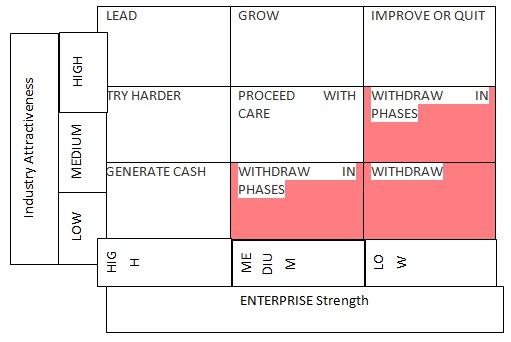- Business Concepts ›
- Marketing and Strategy ›
- Harvesting Strategy
Harvesting Strategy
Definition & Meaning
This article covers meaning & overview of Harvesting Strategy from marketing perspective.
What is meant by Harvesting Strategy?
When the revenue made by additional investment would not overcome the expense, all marketing investment in a particular business line is reduced or eliminated, as sales revenue falls below a cutoff point. This is called harvesting strategy.
Harvest strategy is used for products that have reached the stage of cash cow, i.e. matured and is unlikely to grow any further even if investments are made. Since some of the businesses are successful, that extra revenue can be reused into increasing the performance of the comparatively poorer brands. For example, a brick and mortar books company may take profits from its business to supplement research and development for its ecommerce business if growth and profits in that business are more likely. Consumer behavior changes dictate which brands become cash cows due to the advancement of technology.
An exit strategy means selling the entire company and exiting from the market and it is considered the extreme form of harvest strategy.
Reasons for Product harvesting:
When a clear trend of the product sales growth rate slowing down occurs, a company owner may take a decision to implement a harvest strategy. The company increases its value by redeploying the assets used in the earlier business to pursue new opportunities.
In order to execute the strategy, discretionary expenses are reduced such as promotion & advertising, and the investments are used to expand the business line in new dimensions. Thus in the below figure the Boxes in light red, suggest that according to business strategy matrix, the company should consider opting for a harvesting strategy or going for divesting the business.

Hence, this concludes the definition of Harvesting Strategy along with its overview.
This article has been researched & authored by the Business Concepts Team which comprises of MBA students, management professionals, and industry experts. It has been reviewed & published by the MBA Skool Team. The content on MBA Skool has been created for educational & academic purpose only.
Browse the definition and meaning of more similar terms. The Management Dictionary covers over 1800 business concepts from 5 categories.
Continue Reading:
What is MBA Skool?About Us
MBA Skool is a Knowledge Resource for Management Students, Aspirants & Professionals.
Business Courses
Quizzes & Skills
Quizzes test your expertise in business and Skill tests evaluate your management traits
Related Content
All Business Sections
Write for Us